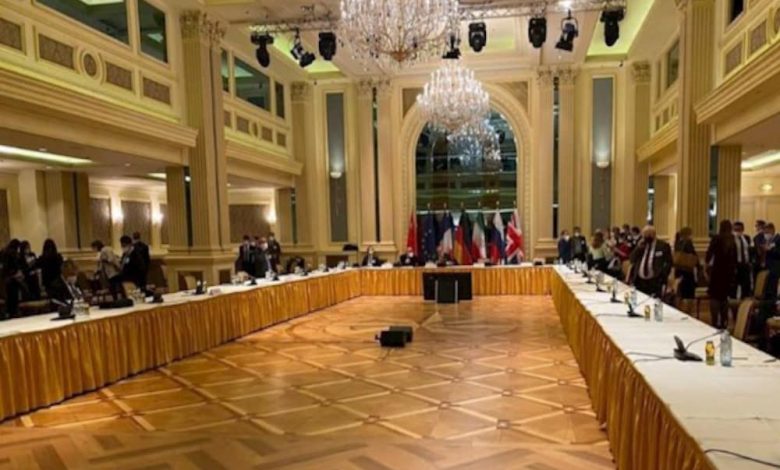Would Lifting Sanctions and Negotiations With Tehran Boost Iran’s Economy?

Written by
Mahmoud Hakamian
On Wednesday, the Iranian regime and world power concluded their fifth round of informal talks in Vienna aimed at reviving the 2015 nuclear deal or Joint Comprehensive Plan of Action
In recent days, there have been calls by the western powers on Tehran to resume talks in Vienna to restore the 2015 nuclear deal. Those in favor of dialogues with Iran’s terrorist regime claim that restoring the nuclear deal would positively affect Iran’s worsening economy. But would it?
Iran’s economy suffers from the regime’s institutionalized corruption. Sanctions have secondary effects on Iran’s worsening economic situation. But let’s assume sanctions are the only reason behind Iran’s failing economy. Sanctions are imposed due to the regime’s efforts to obtain nuclear bombs, support of terrorism, and ongoing human rights violations
“While Iran and China have a 25-year cooperation agreement and some forecasts indicated an increase in Iranian oil sales to China, the Tehran Chamber of Commerce data show that in the first eight months of 2021, Iran’s oil sales to China dropped by more than $11 billion, compared to three years ago. At the same time, Saudi Arabia’s oil sales to China grew significantly,” wrote the state-run Tejarat News reported on October 21.
“Oman, Iraq, Kuwait, and the UAE are the other four countries whose oil sales to China have also increased during this period to compensate for China’s drop in oil supply from Iran,” the website added.
According to Tehran’s apologists, sanctions are the only problems of Iran’s economy, so Tehran could immediately have them lifted if it stops all its malign activities.
“Most of the sanctions are imposed due to our ideology, and obviously, standing up for ideology will incur costs. But the debate is not about why and how the sanctions are imposed. The question is, why do we refuse to take safe paths against sanctions and impose a lot of economic costs on the country?” wrote the state-run Eghtesad-e Pouya on October 4.
For a better understanding, let’s look at Instrument in Support of Trade Exchanges (INSTEX), a European special-purpose vehicle (SPV) established on January 31, 2019. To help Tehran evade U.S. sanctions, reimposed in 2018 after the Trump administration withdrew from the JCPOA, the European Union started INSTEX, a financial mechanism to facilitate non-USD and non-SWIFT transactions with Iran. Tehran could have used INSTEX if it had ratified the conventions of the Financial Action Task Force (FATF).
Fitting a Square Peg into a Round Hole with Iran Negotiations – April 2021
The FATF had given enough time to Tehran to finalize the laws that would allow the country to join the Palermo and Counter Financing Terrorism (CFT) conventions against funding terrorism and money laundering.
But many regime officials described adopting CFT and Palermo conventions as “self-sanctioning.” Iran’s economy is dominated by Revolutionary Guards (IRGC), which is considered a terrorist organization. Besides, by adopting the FATF conventions, Tehran would not be able to fund its terrorist proxy groups such as Hezbollah and Houthis.
It is worth noting that Tehran continues funding terrorist organizations, calling them the “axis of resistance.” The regime’s supreme leader, Ali Khamenei, and other leading officials have underlined that if they had not fought in the Syrian War, they had to “fight in Tehran.” The regime has long used terrorism to export domestic chaos abroad.
It should be noted that according to Iran’s Central Bank, Tehran’s oil export revenue was around $180 billion in 2018 and 2019 alone. Yet, it is unclear where these earnings ended up. Yet, it is clear they were not used to address people’s problems, as two major Iran protests erupted in 2018 and 2019, with people demanding their basic rights.
Reuters reported on December 2020 that the mullahs have spent “$600 million” to expand the holy shrine of Imam Hussein in Iraq. Meanwhile, Iranians are struggling to make ends meet.
“The Ministry of Cooperatives, Labor, and Social Welfare Labor stated in a report that until 2021, 26 million people of the country lived in absolute poverty,” the state-run ILNA News Agency reported on October 22. The poverty line in Iran differs from 10 to 15 million tomans. Meanwhile, the salary base of the Iranian workers and employees is around four million tomans.
According to the state-run Arman daily on October 21, “Living in Iran has turned into a marathon of survival. Workers earn less than 3 million tomans. Could officials put themselves in workers’ shoes for a month? Could they live with 150,000 tomans a day?”
What’s the price of the mullahs staying in power in Iran?
Thus, even if sanctions are lifted today, Iran’s economic situation would not change to people’s benefit. While Western powers continue pushing for negotiations, the Iranian regime continues its deceptive policy, dragging its feet with negotiations and attempting to acquire a nuclear bomb.
Iran’s nuclear deal with world powers, formally known as the Joint Comprehensive Plan of Action (JCPOA), was signed in 2015, allowing Tehran to enrich uranium lower than 5%. The deal’s signatories claimed the JCPOA had curbed Iran’s nuclear program and prolonged its “break out” time.
In 2018, Iran began rapidly violating its commitments under the JCPOA’s terms and could rapidly enrich uranium at %60 of purity. Thus, it became evident that the JCPOA had many loopholes allowing the regime to secretly continue its nuclear program.
The western powers should avoid giving concessions and time to Tehran. The Iranian regime only understands the language of firmness. They should reimpose all sanctions on the regime. The Iranian regime is indeed losing time as it faces a restive society and as another uprising in Iran is on the horizon.
Would Lifting Sanctions and Negotiations With Tehran Boost Iran’s Economy?

